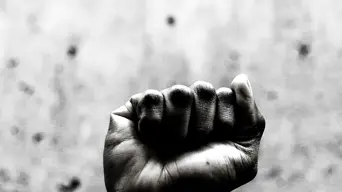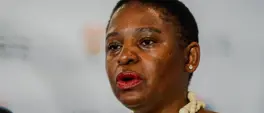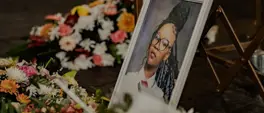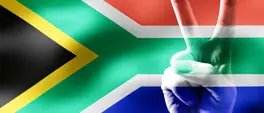JAMIL F. KHAN | Heritage beyond celebration: Carrying forward South Africa's duty to resist injustice
Jamil F. Khan
25 September 2025 | 7:15"While we may be worn down, standing up against injustice is also our heritage as South Africans with a historical obligation to resist apartheid."

Raised fist. Unsplash/Oladimeji Odunsi
I grew up in a time of great optimism and vibrant human rights discourse, following the 46-year crime against humanity that was South African apartheid. In the wake of the Second World War, and during The Troubles of Ireland and the Rwandan Genocide, defeating yet another fascist regime seemed to signal a societal turning point.
Though, of course, systemic oppression persisted in many forms, denouncing state-sanctioned mass killing of people for any reason seemed to become common sense. That South Africa was an example of overcoming apartheid also became common sense.
Under these social agreements, I became used to referring to apartheid in the past tense, and as a result, I understood myself to have the experience of a post-apartheid world. Many have imagined what they would have done if they lived through those atrocities, and today, we are living through the atrocity of our time: Israeli apartheid, which has escalated to full genocide. This is also the heritage of South Africans who will always have a connection to this atrocity wherever it manifests in the world.
This month, we celebrate our heritage as South Africans. Like most public holidays in South Africa, it celebrates what colonialism and apartheid tried to erase.
These days of national significance also serve to remind us of the sacrifices and losses our path is littered with. Ironically, in our celebration of heritage and its survival, we do not reckon with loss, violence, and resistance as part of what we have inherited.
When denied and covered up, colonialism and apartheid only grow and escalate. When forgotten, apartheid comes back to a world that has decided on an acceptable amount of human suffering to live with.
For many people, celebrating heritage is a painful activity that cannot be eased through ignorance. As victims of forced removals and land dispossession under apartheid, many South Africans have holes and question marks in their family trees.
Apart from losing land, and a sense of home, people also lost languages and memories.
Against our will, our collective heritage is so deeply intertwined with colonialism and while we celebrateour survival, we must reckon with how we are still living through it.
Most important to realise is that the apartheid Israel is implementing is the same, however modified in more horrific ways, as the apartheid of South Africa, therefore, we are connected to the struggle of the Palestinians.
In the same way that our liberation movements were criminalised as terrorist organisations, so are Palestinian liberation movements and, throughout, Israel was a friend of apartheid South Africa. This connects us directly to Palestinian liberation, which requires us to resist, as we did against our own oppressors. This is our heritage, and it is heritage worth remembering.
Hellen Zille, a beneficiary of both apartheid and post-apartheid South Africa, this week refused to acknowledge that Israel is committing a genocide while offering a PR appropriate platitude about a two-state solution.
This, of course, is but the latest pro-colonisation waffle from the person ho once insisted that colonialism wasn’t all bad and came with benefits. This commitment to the distortion of our collective memory is a feature of various authoritarian regimes, like Israel and the United States, finding support everywhere, even here.
We, again, speak of apartheid in the present tense and yet, throughout our 31-year democracy, we have been told to move on from it because it happened so long ago. This current escalation of white supremacist violence is not a new occurrence, but a salute to a world order that has thrived on the oppression of a global majority.
31 years have not been enough for us to get over apartheid, but it certainly seems to be enough for it to return to contemporary relevance. Upon its return, we should remain vigilant of how much of our celebration is about truly honouring our cultural diversity, and how much is about distracting ourselves from the enduring legacy of colonisation, and the relentless dispossession it unleashes on us.
We should also sit with the grief of losing so many stories, memories and forms of wisdom to the insatiable violence of colonial domination. What we do remember better is how we fought back. While we may be worn down, standing up against injustice is also our heritage as South Africans with a historical obligation to resist apartheid.
For better or worse, we have inherited a responsibility to reject oppression in all forms, and while our shared rituals and forms of expression might bring needed colour to the day, we must remember the seriousness of heritage in this climate. While we exercise the privilege of remembering, the genocidal impulse of apartheid is always meant to wipe out all traces of indigenous culture and memory. To erase the memory of indigenous cultures allows colonialism to escape questioning and ultimately, accountability.
As some world leaders are now taking action to turn their backs on Israel, as the world eventually did with apartheid South Africa, pressure towards consequences signals a turn to accountability, however late. We cannot extricate ourselves nor can we look away from the atrocities of our time knowing how much of our post-apartheid condition still involves resisting.
Heritage is expressed in many ways, and while tightly tied to culture, we know that practices that make up culture have always been informed by the demands of the societies of the time.
This ime demands that we end apartheid again. Celebrating Heritage Day 50 years from now, should involve a proud recollection of honouring our legacy of struggle against injustice.
On anti-apartheid activism, future generations of South Africans should be able to look back on us as justice-loving people who were committed to an anti-colonial future for them. Heritage is not only about our individual cultures and traditions, but also a legacy of service to humanity whose collective survival has always been a community project. It is in our ability to never waiver on our support for the equal recognition of all human rights. We have always gone further, together.
Jamil F. Khan is an award-winning author, doctoral critical diversity scholar, and research fellow at the Johannesburg Institute for Advanced Study
Get the whole picture 💡
Take a look at the topic timeline for all related articles.















